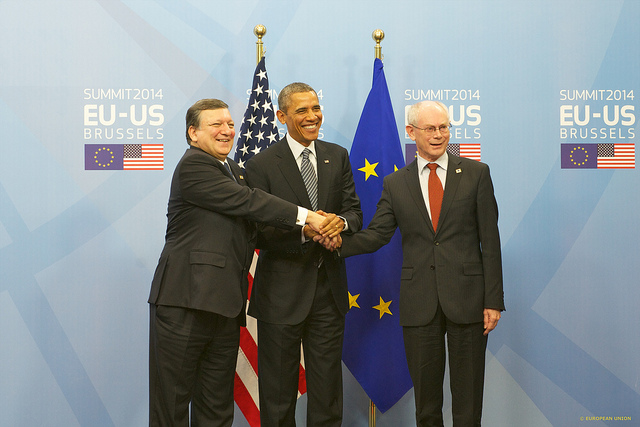The crisis in Ukraine has shifted US attention back to Europe. From Washington DC, E&M author Catalina Geib looks at the transatlantic relationship and questions the strength of the long-held strategic partnership.
Walking by the White House on a cold day in March, your correspondent encountered a familiar sight of peaceful protesters waving their flags to the sounds of emotional speeches ringing out from megaphones. This time, it was the Ukrainian expat community, loudly expressing their anger at Russia’s interventionist politics with placards telling Putin: “hands off Ukraine.”
Yet, peculiarly, right beside each other you could spot the EU and US flags flying above the yellow-blue coloured stream of banners and posters. If only the US-EU partnership in foreign policy mattered as much as the symbolic gesture in front of the White House would suggest.
Recent events on the Maidan in Kyiv and Crimea suggest that the relationship is fractured and blurry.
Germany’s foreign minister underlined the EU’s transatlantic relationship with the US as “one of the key partnerships in the world” during his visit to Washington DC at the end of February. Yet recent events on the Maidan in Kyiv and in Crimea suggested that the relationship is in fact fractured and blurry.

A troubled past
Tensions, disagreements and uncoordinated dialogue aren’t new to this partnership. From fears over a possible NATO break-up in the 1980s due to disagreements over the nuclear strategies of the US and the European Community (EC), to strong objections against US sanctions on Iran, Lybia and Cuba in the 1990s and the EU’s divided stance over the Iraq invasion in 2003, the history of EU-US partnership in foreign policy issues is anything but a tale of smooth cooperation and friendly dialogue.
The big stumbling blocks remain the communication platforms and tools that permit such a discourse to take place. Even after the 2010 Lisbon treaty, which aimed to consolidate a common foreign policy and security strategy for the EU and gave rise to the European External Action Service (EEAS) with its high representative Lady Ashton, the EU remains a weak foreign policy actor. The question that Kissinger once asked is still valid for US officials today: “Who do I call, when I want to call Europe?”
Victoria Nuland aimed to convene high-ranking foreign policy members with UN officials, because “you know, fuck the EU”.
With the President of the European Commission, the European Council, the European Parliament and the EEAS high representative all meddling in foreign policy (some more than others), its clear that the EU has plenty of work to do to before it can have a coherent relationship the US. Economic and political power is unevenly distributed among the leading figures of the EU. As a former advisor to the White House under Bush has explained, for Democrats and Republicans alike, the EU cannot be viewed as a commited and accountable actor. Without the capacity to intervene militarily as a whole body, real diplomatic pressure cannot be backed up by action. Hence, political outreach with the EU ends in frustration and confusion.
Its irresponsiveness and slow reaction – a product of the need to compromise between 28 different states’ interests – are detrimental to clear action when stakes are high and diplomatic tensions rise. Nothing demonstrates this more clearly than a leaked conversation which took place back in December, when assistant US Secretary of State Victoria Nuland talked to the US ambassador to Ukraine Geoffrey Pyatt about possible solutions regarding the upheavals on the Kiev’s Independence Square.
Not only did the conversation clarify that the US was deeply involved in Ukraine; it also demonstrated the lack of trust and disrespect that US diplomats hold for their EU counterparts. Nuland aimed to convene high-ranking foreign policy members with UN officials, she stated in the conversation, but “you know, fuck the EU”. No three words have ever meant so much in US-EU politics. They encapsulate what some US officials feel about the EU: that while EU members are still deciding on how to decide on their response, the US is already strategically moving their chess pieces around the board. Although Nuland apologised to her EU colleagues, none other than Anglea Merkel immediately made her outrage clear. Meanwhile Lady Ashton remains silent, largely because she continues to work the backroom of activists in Ukrainian politics.
Strength in bilateralism?
It shouldn’t be a surprise that neither Obama nor Kerry gave Lady Ashton a phone call when the crisis in Ukraine rose to a critical level. Instead, they reached directly for the bilateral partnerships with France, UK, Germany and Poland, isolating the EEAS from these discussions..
That isn’t to say that these bilateral partnerships are strong enough to bridge the challenges faced by the EU-US partnership. During the recent Syrian crisis, the UK ‘special relationship’ suffered an unexpected setback when Prime Minister David Cameron failed to attain parliament’s approval to support a military intervention alongside the US. The US American Ambassador to the UK, Matthew Barzun, was nevertheless quick to emphasise that the ‘special relationship’ was “still alive and well”.
What has set the UK apart from other bilateral relationships is its long history on the one hand and the military capacity to become an active player on the other. France, depsite being less inclined to play this role, could prove to be a longstanding partner. Jacques Chirac’s refusal to support US invasion in Iraq in 2003 set France on its recent path of disengagement with the US. Neither Germany nor Poland have the military capacity to stand as a critical US partner, but both are strong economic powers. Poland’s role in the Ukrainian crisis has demonstrated that the state is a serious diplomatic player.
A recent survey on US perceptions of germany indicated high esteem.
A recent survey on US perceptions of Germany published by Frank M Associates even indicated high esteem for Germany among Americans, and suggested that the relationship will be critical for future international policymaking.
The challenges facing the EEAS
It is inter-governmental rather than global institutional power that continues to rule day in foreign policy. Despite playing a high-profile role in the Ukrainian crisis, the EU Member States proved to be hesitant and divided at critical points, such as how far to impose sanctions on Russia.

Behind closed doors at the Paris summit with Russia’s Foreign Minister Sergei Lavrov, European Ministers and John Kerry attempted to reach common ground with Russia, establishing at least a (previously dormant) transnational dialogue with the West on the situation in Crimea. Although no concrete steps were taken, it represented the only effective communication between these diverse actors to date.
All this points to the EU’s achilles’ heel in forging a strong and meaningful partnership with the US and in the foreign policy arena in general. Sensing that the EU is not strong enough to act against Russia, Moldova is desperately seeking assistance from the US unilaterally. The recent visit of Moldova’s president Iurie Leanca to Washington DC has made this very clear. As Eastern European states look beyond the EU towards the US, this might be the last chance to prove that the EU can be useful in a US partnership.
A long overdue EU-US summit may have brought the two powers closer together temporarily but the fact that this is Obama’s very first visit to Brussels speaks volumes of the EU’s place in the European partnership. Even if future talks on the Transatlantic Trade and Investment Partnership (TTIP) are successful and forge new economic links across the Atlantic, the EU will have to demonstrate a fundamentally coherent position towards the world to be a valuable strategic partner to the US.
Cover Photo: Open Democracy, CC BY-NC-ND 2.0 (Flickr)







